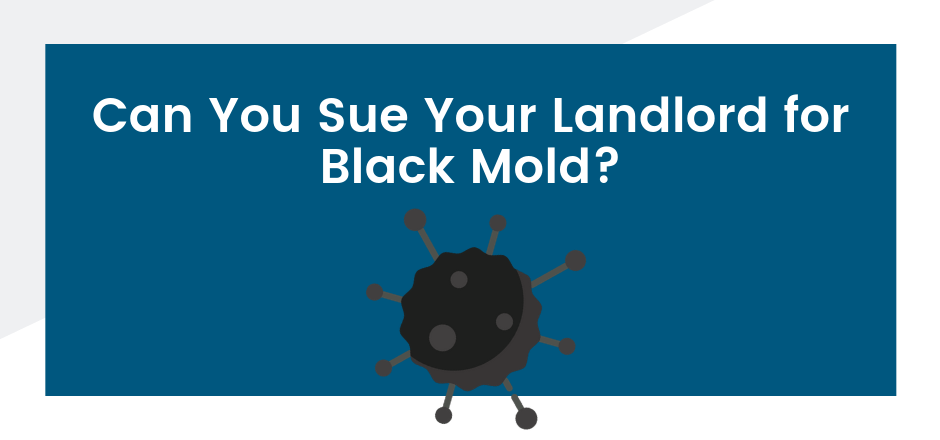Can You Sue Your Landlord for Black Mold?
As a tenant in California, you have the right to demand your landlord fix any problem that impacts the habitability of the property you’re renting. Black mold is considered a major problem because it can cause serious health complications if ignored.
If your landlord fails to address a black mold problem, you can break your lease early.
Can you sue your landlord for black mold though?

Can You Sue Your Landlord for Black Mold?
In an ideal situation, landlords and tenants work together. Each takes a share of the responsibility for the property leased out, working together to keep it clean, neat, and in habitable condition – a condition specifically defined by federal and state law.
Unfortunately, tenants and landlords don’t always agree, especially when it comes to issues of repair or maintenance. When landlords fail to properly maintain a rental unit, tenants may find themselves struggling in unhygienic or unsafe conditions that present a health risk, such as black mold infestation.
The California Tenants—A Guide to Residential Tenants’ and Landlords’ Rights and Responsibilities gives you the right to demand your landlord fix any issues impacting the habitability of your rental property. This includes contamination with “black mold.”
If a landlord refuses to intervene or treat black mold infestations, you may have the right to break your lease early. You may also have the right to sue – but this right is not necessarily set under the California Tenants guide.
What is Black Mold?
Black mold is a type of fungus called Stachybotrys chartarum. It colonizes and grows in homes, apartments, and condominiums where moisture levels are overly high, typically due to leaks, high humidity, or running water.
Stachybotrys chartarum often begins colonizing in specific areas, like alongside improperly sealed windows and ceilings. It may also develop in and around sinks, bathtubs, and toilets and/or leaky foundations in basement walls.
The Environmental Protection Agency (EPA) reports that molds don’t generally cause a problem indoors when habitations are kept in good conditions. It does, however, report that some pathogens (like S. chartarum) can lead to serious health problems when colonies begin to flourish and grow.
The Center for Disease Control (CDC) correlates this information, confirming that mold infestations may lead to allergies, respiratory issues, headaches, and hypersensitivity pneumonitis. Limited reports also link black mold with more serious conditions like pulmonary hemorrhage or memory loss, although it isn’t yet clear whether this is directly tied to mold or other variables, such as environmental conditions or a patient’s chronic health problems.
Left untreated, most scientists agree that S. Chartarum can at least lead to respiratory distress, serious illness, or even death in sensitive patient populations. While severe infestation is more closely tied to severe health consequences, any amount of black mold is unsafe. Infestations must be treated thoroughly and properly in order to eradicate the problem.
Is a Lawsuit a Logical First Step?
If you find black mold in your apartment, can you sue your landlord – and should you? The answer, unfortunately, is “maybe,” which is admittedly unhelpful when you’re in the middle of dealing with a difficult landlord.
The California Civil Court generally holds the expectation that landlords and tenants must at least attempt to find a resolution on their own before coming to court. This makes sense; lawsuits are expensive, and the problem can often be worked out without court intervention.
First, you should attempt to make contact with your landlord and request assistance or intervention in writing. Give a reasonable amount of time for a response in comparison with the issue you are experiencing. One to two weeks is a reasonable amount of time to allow for resolution unless the risk is unusually high.
For mild cases, such as a few spots along a windowsill, your landlord may tell you to self-treat at home with antifungal spray or bleach. In more advanced cases, your landlord may need to call in a professional to treat the mold and/or replace infested materials, such as ceiling tiles, carpet, or wooden window frames.
But what happens if your landlord refuses to intervene or strings you along? And what can you do if the landlord treats the issue, but your physician later diagnoses you with mold-related health problems? While you may have the ability to sue, these cases can be notoriously complex. Generally, you need to prove the mold caused you harm directly in order to succeed.
Related: 10 Reasons to Sue Your Landlord for Negligence
Is the Landlord Ignoring the Problem?
If you inform your landlord of the presence of black mold, and he or she refuses to intervene, your first step should be to contact the rental board for your local city and area. Be prepared to provide evidence that you have informed the landlord and granted them an appropriate amount of time to fix the problem.
Your local rent board can help you file a complaint about the infestation. Afterward, you can petition the rental board to intervene. Be aware that you may be required to provide the rent board with proof the treatment was not only needed but imperative to your health and safety as a tenant. You can submit photos, videos, and documents (such as email communications with your landlord) as evidence.
If the rent board decides your complaint is valid, a City Inspector will issue a Notice of Violation (NOV). This document will demand correction and give a specific date for the repairs to be completed. If the landlord refuses to comply, you may be able to leave your lease early. You also stand a much better chance if and when you decide to sue for compensation.
Related: Lawyer for Landlord Tenants Dispute (5 Reasons to File a Claim)
Self-Repair or Withhold Rent?
Unfortunately, some city’s rental ordinances do not allow tenants to withhold rent and/or pay for repairs personally, later deducting the cost from rental fees. However, this may be permitted by state law in certain circumstances.
You should seek the assistance of a lawyer before moving forward with these options. Choosing to withhold rent may lead to eviction and/or being sued for unpaid rental fees by the landlord. It may also invalidate your complaint with the rental board or City Inspector, which can leave you in a more precarious situation.
Suing for Health Problems
It is possible – yet difficult – to sue a landlord for an untreated black mold infestation that later leads to health problems. You have the right to sue even if you are no longer living in the unit.
The problem with black mold lawsuits is that proving a connection between the mold and any health problems is difficult. There is no exact consensus about just how harmful S. chartarum really is to the human body under current science.
Some studies correlate mold infestation with the aggravation of pre-existing chronic health problems, while others show that most molds don’t trigger mold at all. A number of studies both prove and disprove a link between neurological decline or cognitive dysfunction and black mold, making it difficult to find answers.
Related: How to Report a Landlord to the Health Department
Unfortunately, this can put tenants in an awkward position. A landlord can effectively argue that your health problems were caused by some other variable (such as chronic illness) or that they aren’t associated with mold infestation.
It is highly advisable to seek the advice of a lawyer if and when you believe you have been harmed by black mold. You should also document any evidence to support your claim, such as letters confirming a diagnosis of illness due to black mold from your doctor and/or records of treatments provided.
Mold testing from a qualified professional remediation company may also be beneficial. There is a precedence for winning cases if and when the concentration of S. chartarum is higher indoors than in the local area immediately outside your unit. It is unwise to self-test, as the validity of the test may be called into question.
It can be very difficult to sue a landlord for health problems, loss, or damages due to a black mold infestation. However, your chances of success are much higher when you work closely with a landlord-tenant dispute lawyer. If you believe you have a case, connect with an attorney right away.
Are you in search for a certified attorney to represent you?
Let us help you find one today!


